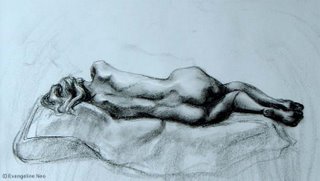
A song is now available for this poem on the Internet Archive!
The Incomplete Seduction of a Scholar and Clerk; or, "Here's My Key, Go Up and Help Yourself."
I.
Thank Jesus you're sleeping
at last in the dark.
I know it from the sigh that
escapes-
in each odd breath,
While too quickly I move
from the still-made covers,
and do not dress as I
switch on
the lamp near the wall.
In -light- the room's read:
books in each corner,
on each table and each
chair, all
bound thick in cold leather.
II.
And in light, you will open
as blank pages do open,
and the white of your back
will part and then fold -
along the ridge of your spine
still shadowed in night:
two thin pages facing
two thin pages facing
---
III.
My finger is tracing
the lines of your shoulder,
reading your skin
as it
might letters in Braille;
Moving above the
slight rise of your lungs
across ribs even-spaced,
stan-
zas unspoken, I--
Break the rough still-
ness of night in the room
with my own sound of
air mov-
ing thin from my lips-
And I will not tell you
Not ever tell you
Not ever tell you
it was not with the [sound of trumpets],
but a whimper.
KMC 9-27-06
4 comments:
I'm especially taken with the middle section (II); that works super-well. I'm not sold on the stanza before that. I think I see what's going on with the "-light-" thing, a sort of foreshadowing of section II, but I have some trouble following there.
The end, too, is really strong.
Do I have to read Book Four Chapter III, p 187, do you think, to get this properly, or to attribute things properly, or does this stand alone, with or without Hollow Men.
glad to see you roaming these parts, brd! the poems we've written should stand alone - we take the titles from sections of paterson, but we try to write them with little to no direct reference to the text (occasionally we'll fill in story details from the larger work, but even that we try to limit). so, to answer, the question: no, no need to read it. as for 'hollow men,' its my favorite eliot poem - how could i not slip in a reference or two somewhere? (good eye on that one, by the way!)
Hollow Men was my favorite Eliot poem until I studied the Four Quartets. Now it is a tie, but Hollow Men is still far more quotable. I mean how hard is it to slip "rats' feet over broken glass" into a sentence. Not hard, I think.
I haven't read through all of your poems yet, but I will. It is more difficult to comment on poetry than on prose, but I will try to say more things just to encourage you to keep writing. You both are very good.
Post a Comment